Nearly a quarter of a century since Bosnia's devastating war ended, former Bosnian Serb leader Radovan Karadzic is set to hear the final judgment on whether he can be held criminally responsible for unleashing a wave of murder and destruction.
United Nations appeals judges will on Wednesday rule whether to uphold or overturn Karadzic's 2016 convictions for genocide, crimes against humanity and war crimes, as well as his 40-year sentence. They will also rule on an appeal by prosecutors against his acquittal on a second count of genocide during Bosnia's war, Europe's bloodiest conflict since World War II.
Click to Gallery
Nearly a quarter of a century since Bosnia's devastating war ended, former Bosnian Serb leader Radovan Karadzic is set to hear the final judgment on whether he can be held criminally responsible for unleashing a wave of murder and destruction.
Amnesty International described the move as "the latest attack on international justice and international institutions by an administration hell-bent on rolling back human rights protections."
Bosnian Serb wartime military commander Ratko Mladic is also awaiting an appeal judgment of his genocide and war crimes conviction, which earned him a life sentence.
Bosnian war survivors believe that appeals judges must keep in place his 10 convictions and his sentence.
"I believe that, at worst, the (appeals) verdict will be much, much more favorable than the first-instance verdict," said Momcilo Krajisnik, Karadzic's political right-hand man during the war. "If we are lucky, he will be a free man."
"We believe that for the crimes he had organized here in Bosnia-Herzegovina he does not deserve 40, but rather 400 years in prison," he said.
A U.N. peacekeeper in Srebrenica ahead of the massacre, Boudewyn Kok has been returning to the eastern Bosnian town annually to pay his respect to the victims. This year, he came with his teenage son so he could tell him about what happened in Srebrenica.
In this Sunday, March 17, 2019 photo, women walk past a war damaged building in Sarajevo, Bosnia-Herzegovina. Nearly a quarter of a century since Bosnia's devastating war ended, former Bosnian Serb leader Radovan Karadzic is set to hear the final judgment on whether he can be held criminally responsible for unleashing a wave of murder and mistreatment by his administration's forces. United Nations appeals judges on Wednesday March 20, 2019 will decide whether to uphold or overturn Karadzic's 2016 convictions for genocide, crimes against humanity and war crimes and his 40-year sentence. (AP PhotoDarko Bandic)
In this Sunday, March 17, 2019 photo, a woman walks a dog past a war damaged building in Sarajevo, Bosnia-Herzegovina. Nearly a quarter of a century since Bosnia's devastating war ended, former Bosnian Serb leader Radovan Karadzic is set to hear the final judgment on whether he can be held criminally responsible for unleashing a wave of murder and mistreatment by his administration's forces. United Nations appeals judges on Wednesday March 20, 2019 will decide whether to uphold or overturn Karadzic's 2016 convictions for genocide, crimes against humanity and war crimes and his 40-year sentence. (AP PhotoDarko Bandic)
In this Sunday, March 17, 2019 photo, cyclists ride past war damaged buildings in Sarajevo, Bosnia-Herzegovina. Nearly a quarter of a century since Bosnia's devastating war ended, former Bosnian Serb leader Radovan Karadzic is set to hear the final judgment on whether he can be held criminally responsible for unleashing a wave of murder and mistreatment by his administration's forces. United Nations appeals judges on Wednesday March 20, 2019 will decide whether to uphold or overturn Karadzic's 2016 convictions for genocide, crimes against humanity and war crimes and his 40-year sentence. (AP PhotoDarko Bandic)
In this Sunday, March 17, 2019 photo, a man places flowers at the section of a cemetery for 1990s war victims in Sarajevo, Bosnia-Herzegovina. Nearly a quarter of a century since Bosnia's devastating war ended, former Bosnian Serb leader Radovan Karadzic is set to hear the final judgment on whether he can be held criminally responsible for unleashing a wave of murder and mistreatment by his administration's forces. United Nations appeals judges on Wednesday March 20, 2019 will decide whether to uphold or overturn Karadzic's 2016 convictions for genocide, crimes against humanity and war crimes and his 40-year sentence. (AP PhotoDarko Bandic)
In this Sunday, March 17, 2019 photo, a woman lights a candle at an Orthodox church in the Bosnian Serb wartime stronghold of Pale, Bosnia-Herzegovina. Nearly a quarter of a century since Bosnia's devastating war ended, former Bosnian Serb leader Radovan Karadzic is set to hear the final judgment on whether he can be held criminally responsible for unleashing a wave of murder and mistreatment by his administration's forces. United Nations appeals judges on Wednesday March 20, 2019 will decide whether to uphold or overturn Karadzic's 2016 convictions for genocide, crimes against humanity and war crimes and his 40-year sentence. (AP PhotoDarko Bandic)
The appeals judgment comes at a time when the global project to hold leaders accountable for crimes is under pressure — last week, U.S. Secretary of State Mike Pompeo said Washington will revoke or deny visas to International Criminal Court personnel seeking to investigate alleged abuses committed by U.S. forces in Afghanistan or elsewhere, and may do the same with those who seek action against Israel.
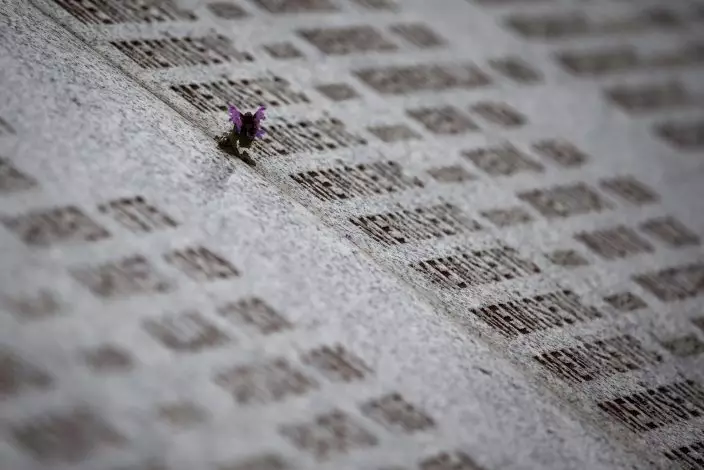
In this Saturday, March 16, 2019 photo, a flower is placed next to a name of a massacre victim carved in memorial cemetery in Potocari, near Srebrenica, Bosnia-Herzegovina. Nearly a quarter of a century since Bosnia's devastating war ended, former Bosnian Serb leader Radovan Karadzic is set to hear the final judgment on whether he can be held criminally responsible for unleashing a wave of murder and mistreatment by his administration's forces. United Nations appeals judges on Wednesday March 20, 2019 will decide whether to uphold or overturn Karadzic's 2016 convictions for genocide, crimes against humanity and war crimes and his 40-year sentence. (AP PhotoDarko Bandic)
Amnesty International described the move as "the latest attack on international justice and international institutions by an administration hell-bent on rolling back human rights protections."
Karadzic was convicted by a different court, the International Criminal Tribunal for the Former Yugoslavia, but should the judges overturn his convictions, it would likely be seen as another damaging blow to international courts.
As the leader of Bosnia's Serbs during the country's devastating 1992-95 war, Karadzic is one of the most senior figures tried by the Hague war crimes court. His case is considered as key in delivering justice for the victims of the conflict which left over 100,000 people dead and millions homeless.
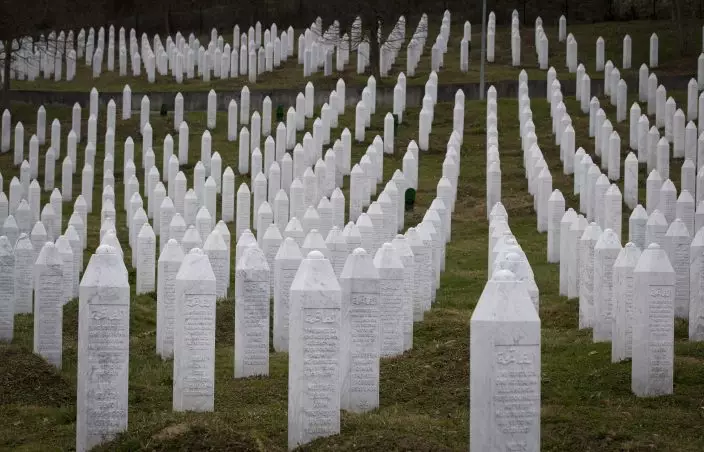
This Saturday, March 16, 2019 photo shows tombs at the memorial cemetery for massacre victims in Potocari, near Srebrenica, Bosnia-Herzegovina. Nearly a quarter of a century since Bosnia's devastating war ended, former Bosnian Serb leader Radovan Karadzic is set to hear the final judgment on whether he can be held criminally responsible for unleashing a wave of murder and mistreatment by his administration's forces. United Nations appeals judges on Wednesday March 20, 2019 will decide whether to uphold or overturn Karadzic's 2016 convictions for genocide, crimes against humanity and war crimes and his 40-year sentence. (AP PhotoDarko Bandic)
Bosnian Serb wartime military commander Ratko Mladic is also awaiting an appeal judgment of his genocide and war crimes conviction, which earned him a life sentence.
At an appeals hearing last year, prosecution lawyer Katrina Gustafson told a five-judge panel that Karadzic "abused his immense power to spill the blood of countless victims. Justice requires that he receive the highest possible sentence — a life sentence."
Last week, Bosnian war wounds were revived when it was revealed that the white supremacist suspected in the mosque shootings that left at least 50 people dead in New Zealand appeared to show admiration for Karadzic and his legacy. In a video, the self-proclaimed white supremacist is seen driving apparently on his way to the attack and listening to a wartime Bosnian Serb song praising Karadzic and his fight against Bosnia's Muslims.
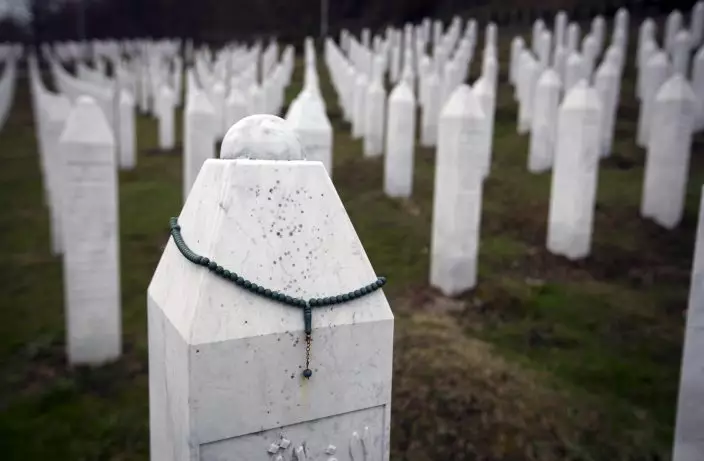
In this Saturday, March 16, 2019 photo, a chaplet hangs on a tomb at the memorial cemetery for massacre victims in Potocari, near Srebrenica, Bosnia-Herzegovina. Nearly a quarter of a century since Bosnia's devastating war ended, former Bosnian Serb leader Radovan Karadzic is set to hear the final judgment on whether he can be held criminally responsible for unleashing a wave of murder and mistreatment by his administration's forces. United Nations appeals judges on Wednesday March 20, 2019 will decide whether to uphold or overturn Karadzic's 2016 convictions for genocide, crimes against humanity and war crimes and his 40-year sentence. (AP PhotoDarko Bandic)
Bosnian war survivors believe that appeals judges must keep in place his 10 convictions and his sentence.
"We expect that he'll get (the punishment) he deserves," said Sehida Abdurahmanovic, who lost 30 relatives in the Bosnian war's bloody climax, the 1995 massacre of some 8,000 Muslim men and boys in Srebrenica. "We expect (the appeals court) to confirm the first-instance verdict and that he will not be allowed at any price to avoid the responsibility for genocide."
But Karadzic supporters are hoping for a reduction in his sentence or even acquittal.
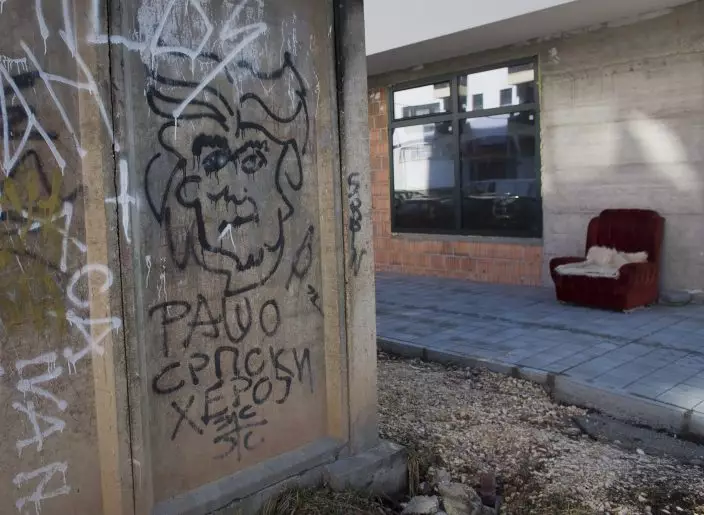
In this Sunday, March 17, 2019 photo, graffiti depicting Bosnian Serb wartime leader Radovan Karadzic on a wall in the Bosnian Serb wartime stronghold of Pale, Bosnia-Herzegovina. Nearly a quarter of a century since Bosnia's devastating war ended, former Bosnian Serb leader Radovan Karadzic is set to hear the final judgment on whether he can be held criminally responsible for unleashing a wave of murder and mistreatment by his administration's forces. United Nations appeals judges on Wednesday March 20, 2019 will decide whether to uphold or overturn Karadzic's 2016 convictions for genocide, crimes against humanity and war crimes and his 40-year sentence. The text in Cyrillic reads: "Radovan, Serbian hero". (AP PhotoDarko Bandic)
"I believe that, at worst, the (appeals) verdict will be much, much more favorable than the first-instance verdict," said Momcilo Krajisnik, Karadzic's political right-hand man during the war. "If we are lucky, he will be a free man."
Krajisnik, himself, was sentenced to 20 years in prison for persecuting and forcibly expelling non-Serbs and crimes against humanity. He was released in 2014 after serving two-thirds of his sentence.
Azir Osmanovic, 36, curator of the Srebrenica memorial, who survived the massacre as a child but whose older brother's remains have not been found, fears that Karadzic's sentence could be reduced.
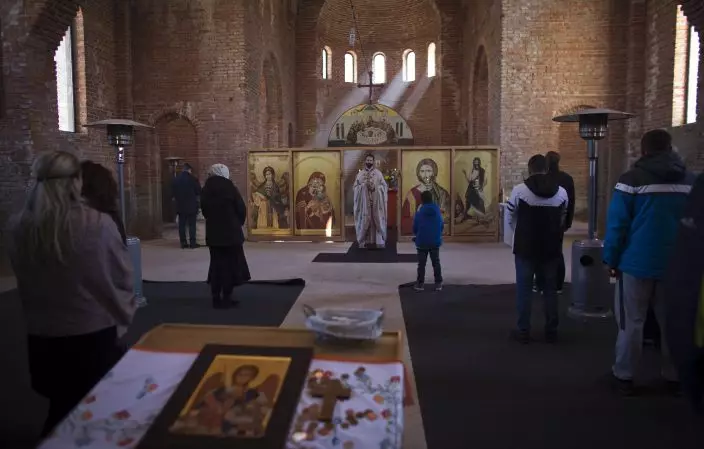
In this Sunday, March 17, 2019 photo, a church service is held at an Orthodox church in the Bosnian Serb wartime stronghold of Pale, Bosnia-Herzegovina. Nearly a quarter of a century since Bosnia's devastating war ended, former Bosnian Serb leader Radovan Karadzic is set to hear the final judgment on whether he can be held criminally responsible for unleashing a wave of murder and mistreatment by his administration's forces. United Nations appeals judges on Wednesday March 20, 2019 will decide whether to uphold or overturn Karadzic's 2016 convictions for genocide, crimes against humanity and war crimes and his 40-year sentence. (AP PhotoDarko Bandic)
"We believe that for the crimes he had organized here in Bosnia-Herzegovina he does not deserve 40, but rather 400 years in prison," he said.
Karadzic was also tried for an orchestrated campaign to drive the Muslims and Croats from Serb-held territories in Bosnia, as well as the more than three-year siege of Sarajevo, Bosnia's capital.
Karadzic remained at large for years before he was arrested in Serbia in 2008 as a disguised new-age therapist.
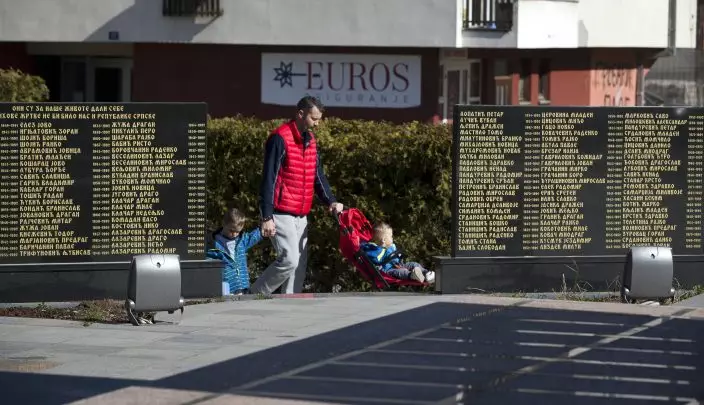
In this Sunday, March 17, 2019 photo, a man walks his children past the monument for Bosnian Serbs killed in 1990s war in the Bosnian Serb wartime stronghold of Pale, Bosnia-Herzegovina. Nearly a quarter of a century since Bosnia's devastating war ended, former Bosnian Serb leader Radovan Karadzic is set to hear the final judgment on whether he can be held criminally responsible for unleashing a wave of murder and mistreatment by his administration's forces. United Nations appeals judges on Wednesday March 20, 2019 will decide whether to uphold or overturn Karadzic's 2016 convictions for genocide, crimes against humanity and war crimes and his 40-year sentence. (AP PhotoDarko Bandic)
A U.N. peacekeeper in Srebrenica ahead of the massacre, Boudewyn Kok has been returning to the eastern Bosnian town annually to pay his respect to the victims. This year, he came with his teenage son so he could tell him about what happened in Srebrenica.
"But unfortunately, the war crimes court has no death penalty," Kok said.
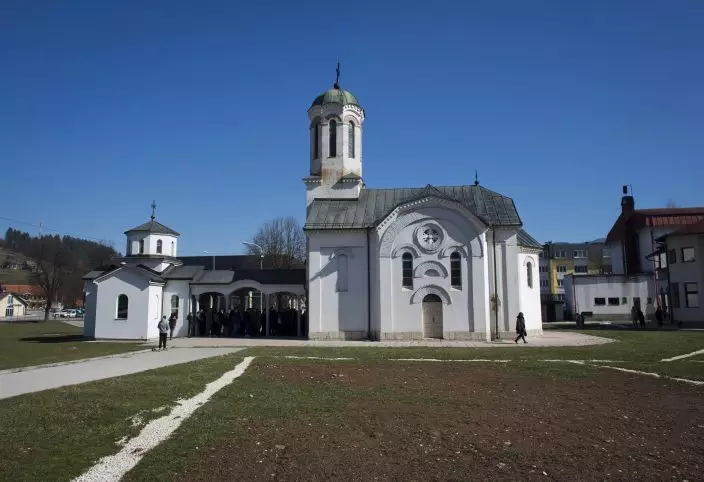
In this Sunday, March 17, 2019 photo, a church service is held at an Orthodox church in the Bosnian Serb wartime stronghold of Pale, Bosnia-Herzegovina. Nearly a quarter of a century since Bosnia's devastating war ended, former Bosnian Serb leader Radovan Karadzic is set to hear the final judgment on whether he can be held criminally responsible for unleashing a wave of murder and mistreatment by his administration's forces. United Nations appeals judges on Wednesday March 20, 2019 will decide whether to uphold or overturn Karadzic's 2016 convictions for genocide, crimes against humanity and war crimes and his 40-year sentence. (AP PhotoDarko Bandic)
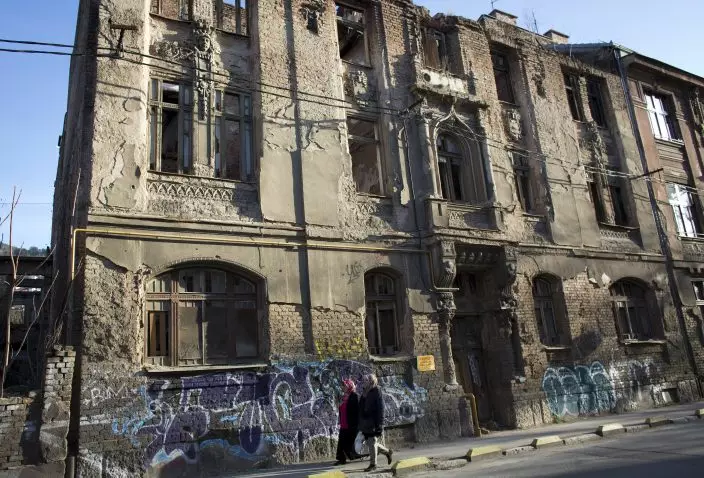
In this Sunday, March 17, 2019 photo, women walk past a war damaged building in Sarajevo, Bosnia-Herzegovina. Nearly a quarter of a century since Bosnia's devastating war ended, former Bosnian Serb leader Radovan Karadzic is set to hear the final judgment on whether he can be held criminally responsible for unleashing a wave of murder and mistreatment by his administration's forces. United Nations appeals judges on Wednesday March 20, 2019 will decide whether to uphold or overturn Karadzic's 2016 convictions for genocide, crimes against humanity and war crimes and his 40-year sentence. (AP PhotoDarko Bandic)
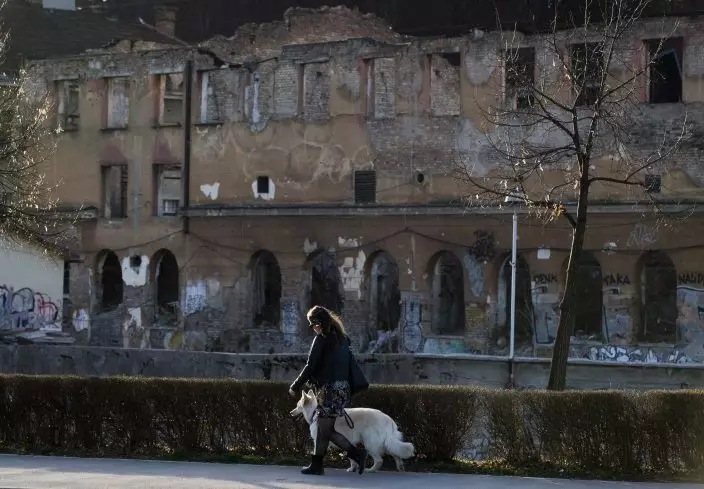
In this Sunday, March 17, 2019 photo, a woman walks a dog past a war damaged building in Sarajevo, Bosnia-Herzegovina. Nearly a quarter of a century since Bosnia's devastating war ended, former Bosnian Serb leader Radovan Karadzic is set to hear the final judgment on whether he can be held criminally responsible for unleashing a wave of murder and mistreatment by his administration's forces. United Nations appeals judges on Wednesday March 20, 2019 will decide whether to uphold or overturn Karadzic's 2016 convictions for genocide, crimes against humanity and war crimes and his 40-year sentence. (AP PhotoDarko Bandic)
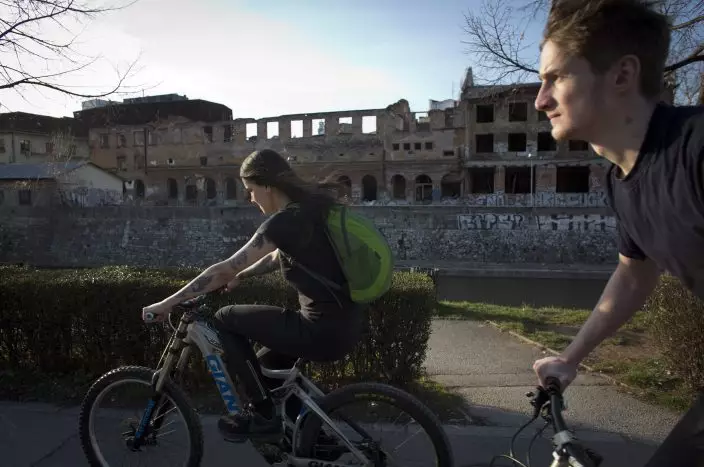
In this Sunday, March 17, 2019 photo, cyclists ride past war damaged buildings in Sarajevo, Bosnia-Herzegovina. Nearly a quarter of a century since Bosnia's devastating war ended, former Bosnian Serb leader Radovan Karadzic is set to hear the final judgment on whether he can be held criminally responsible for unleashing a wave of murder and mistreatment by his administration's forces. United Nations appeals judges on Wednesday March 20, 2019 will decide whether to uphold or overturn Karadzic's 2016 convictions for genocide, crimes against humanity and war crimes and his 40-year sentence. (AP PhotoDarko Bandic)
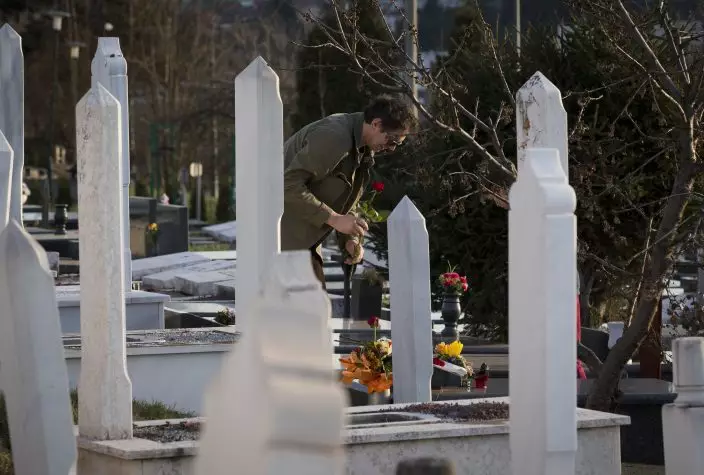
In this Sunday, March 17, 2019 photo, a man places flowers at the section of a cemetery for 1990s war victims in Sarajevo, Bosnia-Herzegovina. Nearly a quarter of a century since Bosnia's devastating war ended, former Bosnian Serb leader Radovan Karadzic is set to hear the final judgment on whether he can be held criminally responsible for unleashing a wave of murder and mistreatment by his administration's forces. United Nations appeals judges on Wednesday March 20, 2019 will decide whether to uphold or overturn Karadzic's 2016 convictions for genocide, crimes against humanity and war crimes and his 40-year sentence. (AP PhotoDarko Bandic)
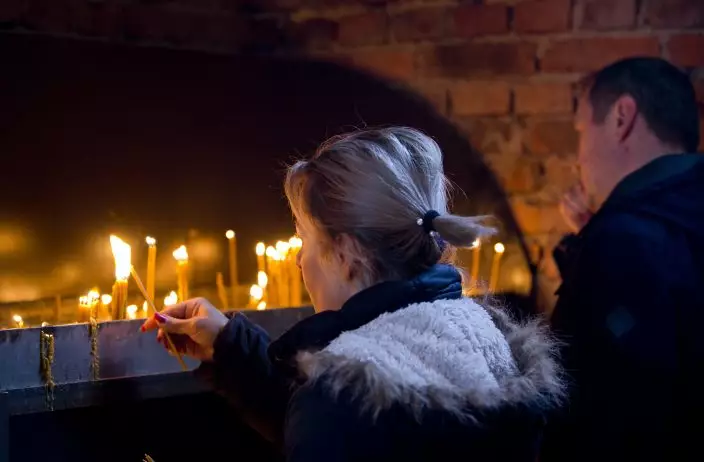
In this Sunday, March 17, 2019 photo, a woman lights a candle at an Orthodox church in the Bosnian Serb wartime stronghold of Pale, Bosnia-Herzegovina. Nearly a quarter of a century since Bosnia's devastating war ended, former Bosnian Serb leader Radovan Karadzic is set to hear the final judgment on whether he can be held criminally responsible for unleashing a wave of murder and mistreatment by his administration's forces. United Nations appeals judges on Wednesday March 20, 2019 will decide whether to uphold or overturn Karadzic's 2016 convictions for genocide, crimes against humanity and war crimes and his 40-year sentence. (AP PhotoDarko Bandic)
PARIS (AP) — French President Emmanuel Macron warned Thursday that Europe could “die” if it fails to build its own robust defense as Russia’s war in Ukraine rages on, or if it fails to undertake major trade and economic reforms to compete with China and the U.S.
Macron urged Europeans to become more ambitious in a fast-changing world to face the challenges of war, fierce trade competition, energy scarcity, climate change and increasing authoritarianism.
In a nearly two-hour speech at Sorbonne University in Paris, Macron said that the continent is divided and “too slow and lacks ambition” at a time when the 27-member European Union needs to become a superpower, defend its own borders and speak with one voice if it wants to survive and thrive.
“Our Europe today is mortal,” Macron said. “It can die and that depends solely on our choices,” he added. He called on people to make those choices now because, “it’s today that Europe is between war and peace.”
Russia's full-scale invasion of Ukraine, now in its third year, is an existential threat and Europe isn't armed enough to defend itself when “confronted by a power like Russia that has no inhibitions, no limits,” Macron said.
‘Our ability to ensure our security is at stake," Macron said. “Russia mustn’t be allowed to win.”
Europe now has the “good fortune” of having the Biden administration’s commitment to supporting Ukraine, Macron said. But, in a year of key elections around Europe, in the U.S. and elsewhere, support may fragment or disappear entirely, he added.
“Europe must become capable of defending its interests, with its allies by our side whenever they are willing, and alone if necessary,” Macron said.
Strong armies, a European rapid intervention program and force, tanks, a missile shield and other weapons, produced in Europe, will need the support of “a joint diplomatic force that will speak with one voice and build bridges with Africa and Latin America,” the French leader said.
“Only then will Europe show that it's not a United States’ lap dog, and that it also knows how to talk to other regions of the world,” he said.
France has been a firm supporter of Ukraine in its fight against Russian aggression, and Macron has often clashed with other Western leaders as he has insisted that Europe must stand by the country at any cost. The French president alarmed European leaders by saying recently that sending Western troops into Ukraine to shore up its defenses shouldn’t be ruled out.
Referring to trade practices of China and the U.S., Macron said “the two world powers have decided not to respect the rules of global trade” by shoring up protections and subsides while Europe’s industry remains open and is stuck in overregulation.
“Let’s do the same, we are in competition,” Macron said.
“We must buy faster, we must produce more and we must buy more that is made in Europe. That is key,” Macron said.
Thursday's speech came less than two months before a pivotal European Parliament election.
Macron, an avid advocate of a united and assertive Europe, also rallied support for his centrist Renaissance party before the June 6-9 vote as far-right parties lead the moderate coalitions in the polls. He called for safeguarding democratic values as the “authoritarian model” was becoming “more popular” across the continent.
The war in Ukraine and immigration are top priorities for European Union voters, according to polls. Far-right parties have gained support by criticizing Macron’s government policies on both issues. Macron acknowledged divisions on immigration policies, including on asylum and deportation rules for those who have arrived to Europe illegally.
He emphasized the need for an effective response and Europe-wide coordination for curbing illegal immigration, closer cooperation with immigrants' countries of origin and a unified, relentless fight against human traffickers.
Macron criticized the idea of striking an agreement, as Britain as done, with countries in Africa and elsewhere to transfer immigrants there.
“This is a betrayal of our values that ultimately leads us to dependency on other counties,” Macron said.
The British government earlier this week approved a law allowing the deportation of some migrants who enter the country illegally to Rwanda.
Macron lost his majority in France’s most influential house of parliament, the National Assembly, after the 2022 election to the far-left coalition and the far-right National Rally party.
The social situation in France remains tense as Paris prepares to host the Olympic Games this summer, amid protests from teachers and police officers, and farmer demonstrations in recent weeks. The protests follow huge rallies last year against Macron’s ultimately successful proposal to increase the retirement age from 62 to 64.
Barbara Surk reported from Nice, France. Lorne Cook contributed to this report from Brussels.
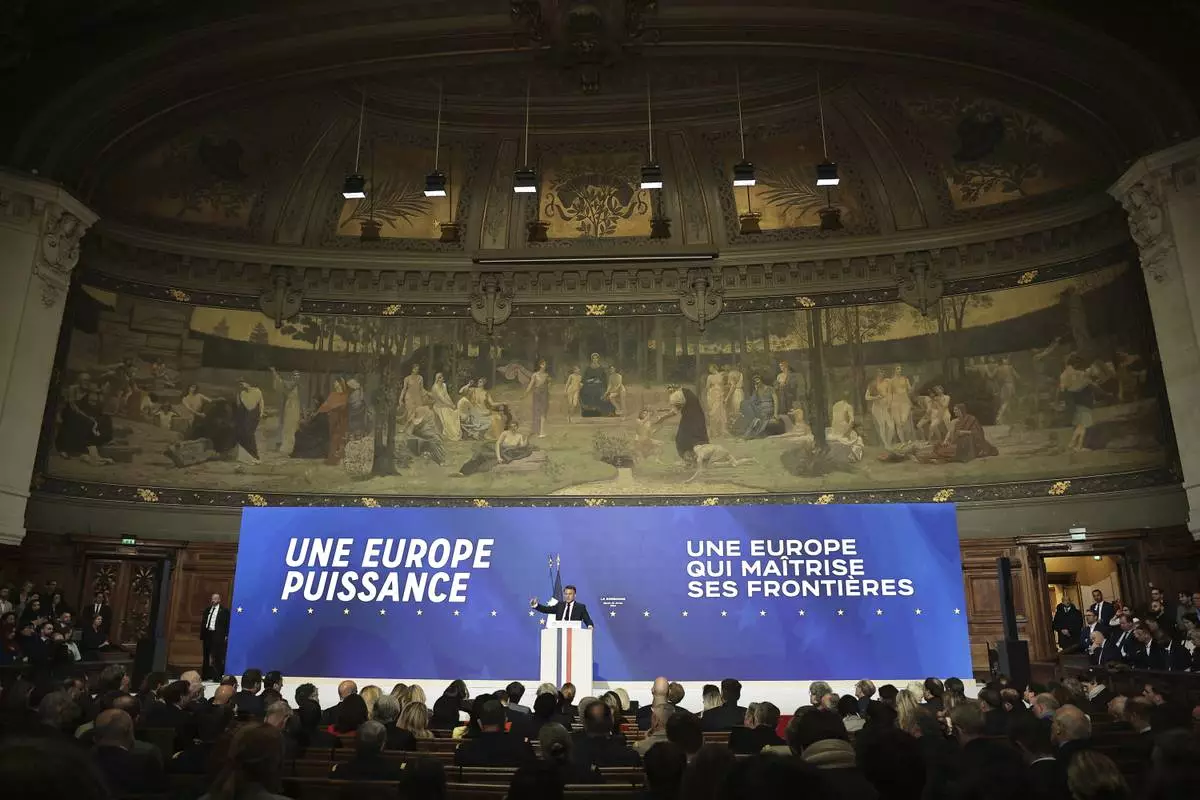
French President Emmanuel Macron delivers a speech on Europe in the amphitheater of the Sorbonne University, Thursday, April 25 in Paris. 2024. French President Emmanuel Macron will outline his vision for Europe as a more assertive global power at the backdrop of war in Ukraine, security, and economic challenges in a speech ahead of pivotal election for the European Parliament in June. (Christophe Petit Tesson, Pool via AP)
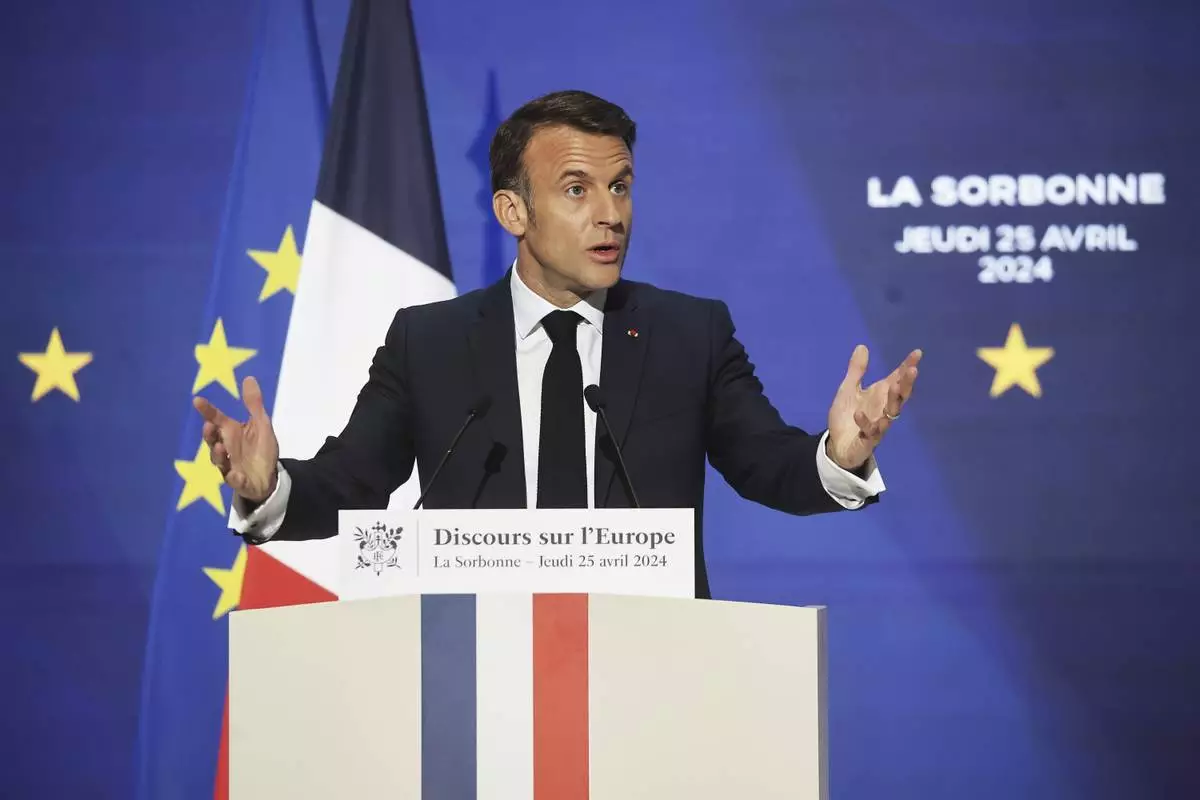
French President Emmanuel Macron delivers a speech on Europe in the amphitheater of the Sorbonne University, Thursday, April 25 in Paris. 2024. French President Emmanuel Macron will outline his vision for Europe as a more assertive global power at the backdrop of war in Ukraine, security, and economic challenges in a speech ahead of pivotal election for the European Parliament in June. (Christophe Petit Tesson, Pool via AP)

French President Emmanuel Macron delivers a speech on Europe in the amphitheater of the Sorbonne University, Thursday, April 25 in Paris. 2024. French President Emmanuel Macron will outline his vision for Europe as a more assertive global power at the backdrop of war in Ukraine, security, and economic challenges in a speech ahead of pivotal election for the European Parliament in June. (Christophe Petit Tesson, Pool via AP)

French President Emmanuel Macron delivers a speech on Europe in the amphitheater of the Sorbonne University, Thursday, April 25 in Paris. 2024. French President Emmanuel Macron will outline his vision for Europe as a more assertive global power at the backdrop of war in Ukraine, security, and economic challenges in a speech ahead of pivotal election for the European Parliament in June. (Christophe Petit Tesson, Pool via AP)

French President Emmanuel Macron delivers a speech on Europe in the amphitheater of the Sorbonne University, Thursday, April 25 in Paris. 2024. French President Emmanuel Macron will outline his vision for Europe as a more assertive global power at the backdrop of war in Ukraine, security, and economic challenges in a speech ahead of pivotal election for the European Parliament in June. (Christophe Petit Tesson, Pool via AP)
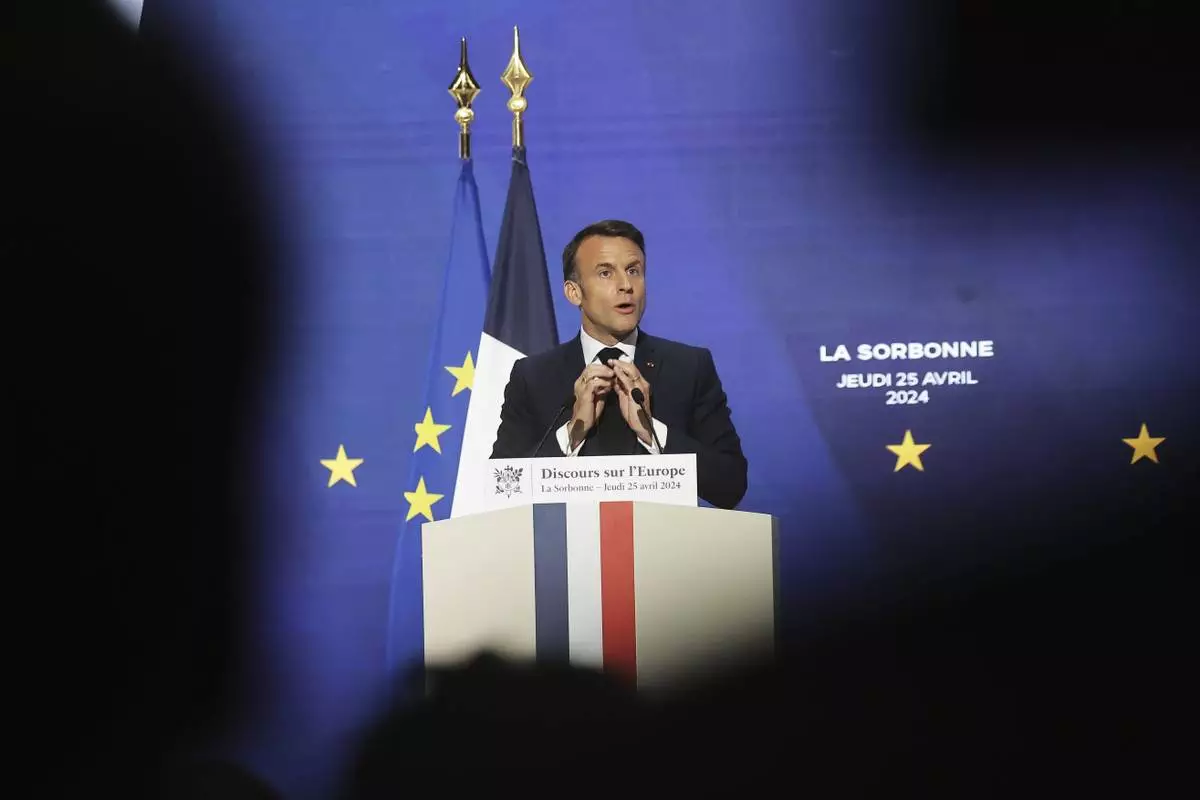
French President Emmanuel Macron delivers a speech on Europe in the amphitheater of the Sorbonne University, Thursday, April 25 in Paris. 2024. French President Emmanuel Macron will outline his vision for Europe as a more assertive global power at the backdrop of war in Ukraine, security, and economic challenges in a speech ahead of pivotal election for the European Parliament in June. (Christophe Petit Tesson, Pool via AP)

French President Emmanuel Macron delivers a speech on Europe in the amphitheater of the Sorbonne University, Thursday, April 25 in Paris. 2024. French President Emmanuel Macron will outline his vision for Europe as a more assertive global power at the backdrop of war in Ukraine, security, and economic challenges in a speech ahead of pivotal election for the European Parliament in June. (Christophe Petit Tesson, Pool via AP)
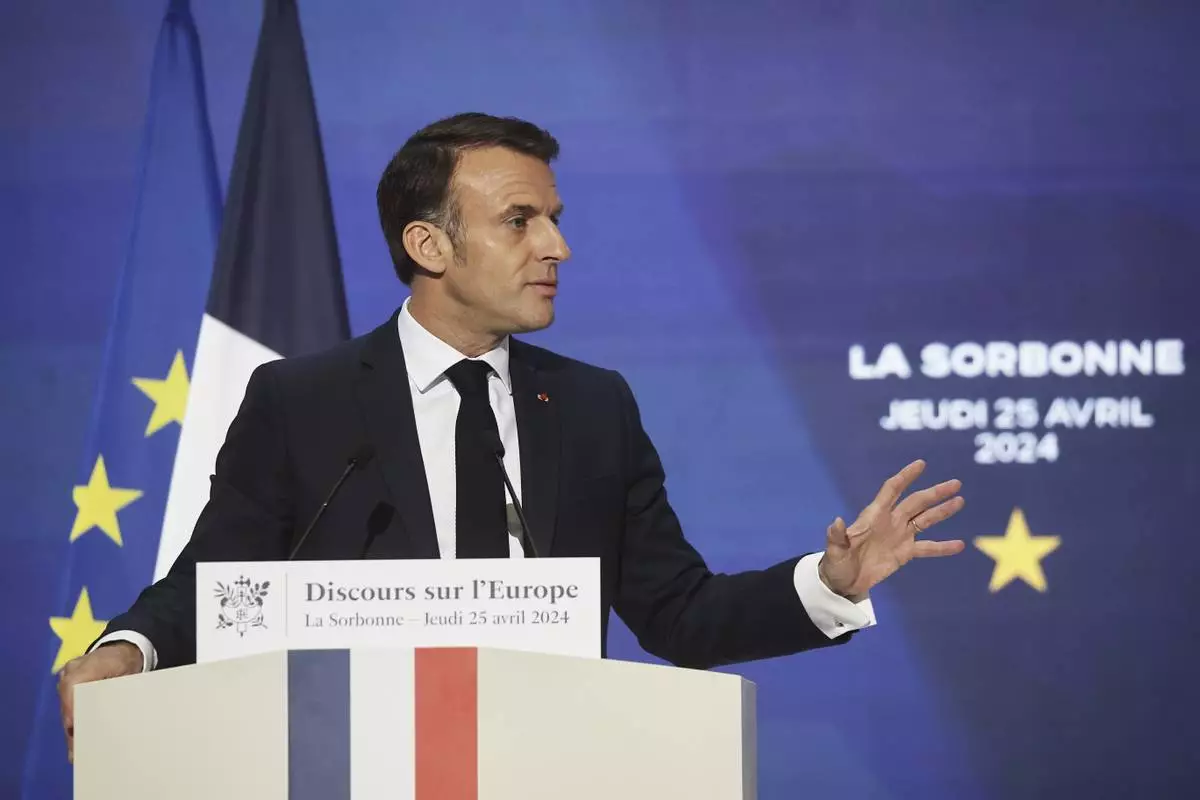
French President Emmanuel Macron delivers a speech on Europe in the amphitheater of the Sorbonne University, Thursday, April 25 in Paris. 2024. French President Emmanuel Macron will outline his vision for Europe as a more assertive global power at the backdrop of war in Ukraine, security, and economic challenges in a speech ahead of pivotal election for the European Parliament in June. (Christophe Petit Tesson, Pool via AP)
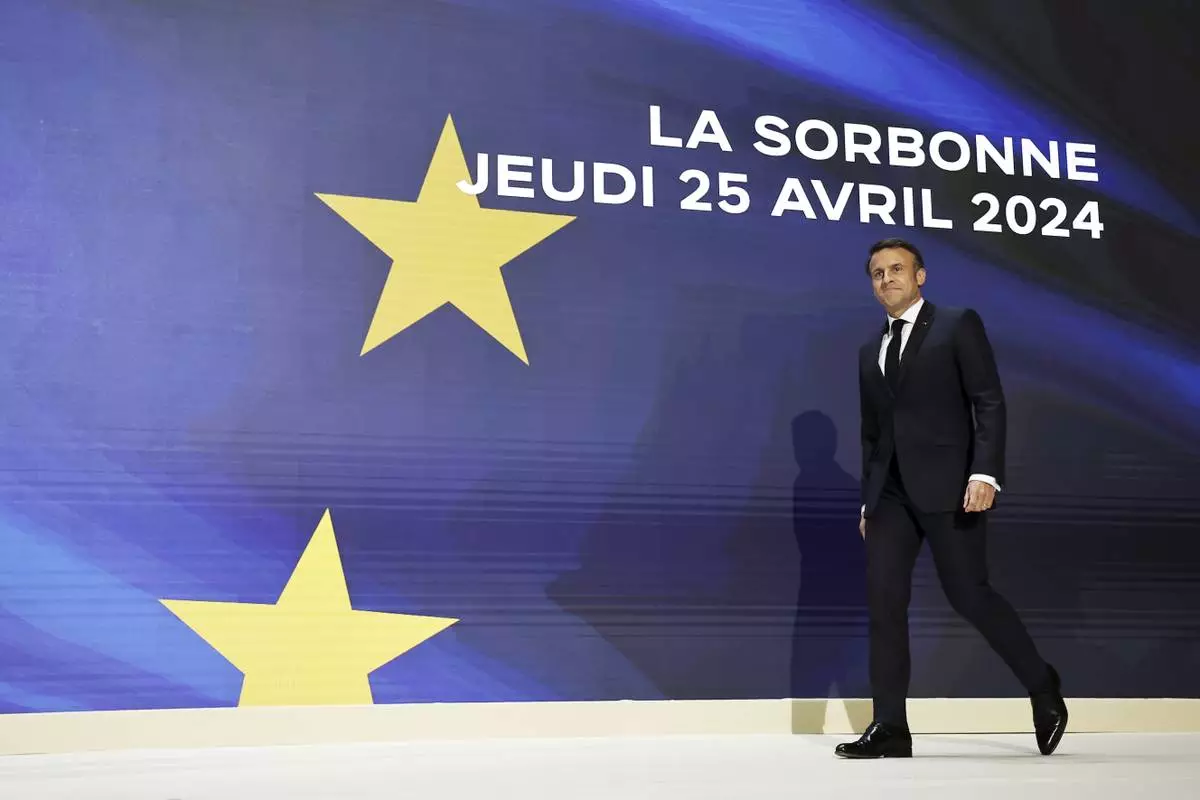
French President Emmanuel Macron arrives to deliver a speech on Europe in the amphitheater of the Sorbonne University, Thursday, April 25 in Paris. 2024. French President Emmanuel Macron will outline his vision for Europe as a more assertive global power at the backdrop of war in Ukraine, security, and economic challenges in a speech ahead of pivotal election for the European Parliament in June. (Christophe Petit Tesson, Pool via AP)
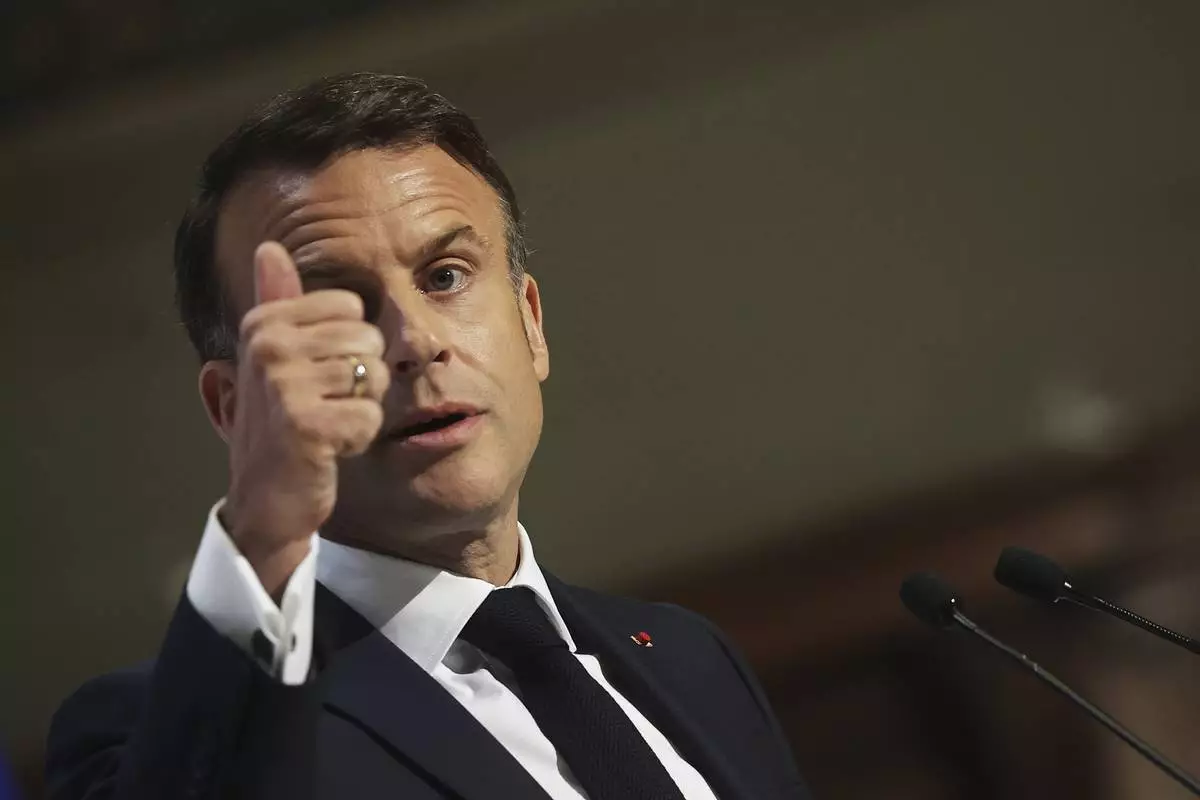
French President Emmanuel Macron delivers a speech on Europe in the amphitheater of the Sorbonne University, Thursday, April 25 in Paris. 2024. French President Emmanuel Macron will outline his vision for Europe as a more assertive global power at the backdrop of war in Ukraine, security, and economic challenges in a speech ahead of pivotal election for the European Parliament in June. (Christophe Petit Tesson, Pool via AP)
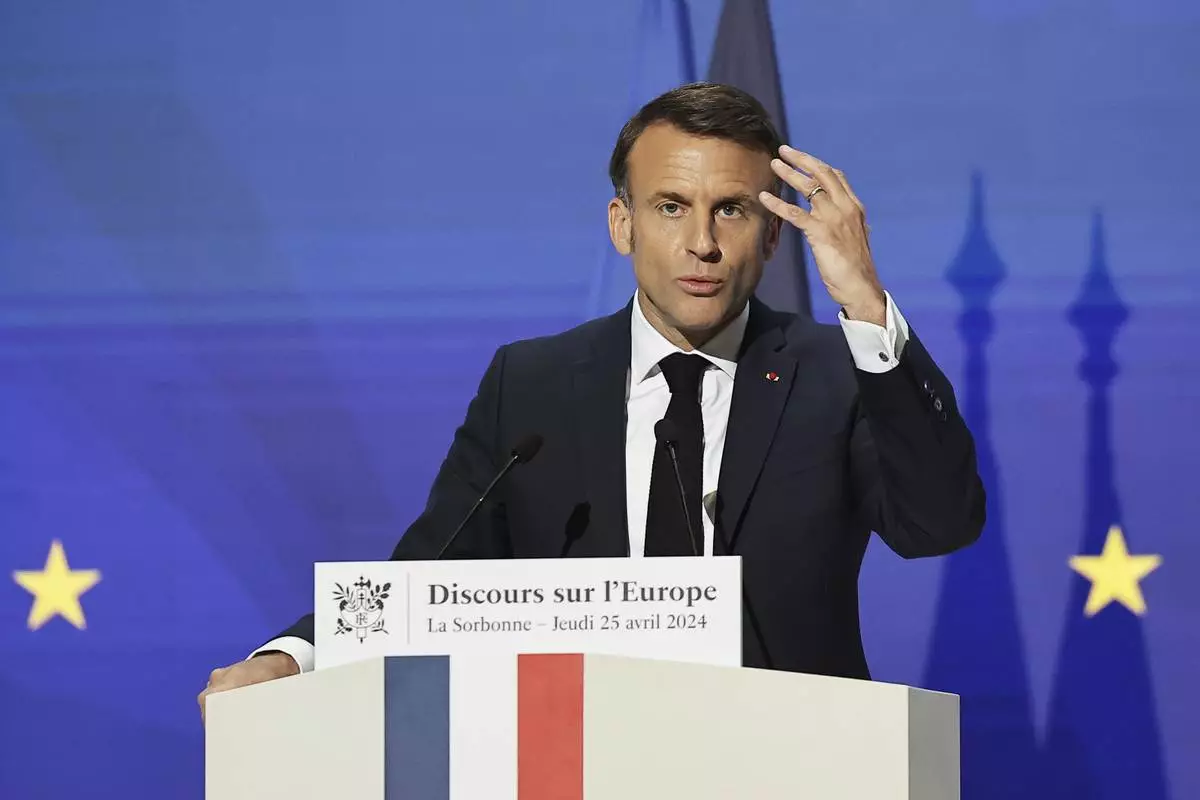
French President Emmanuel Macron delivers a speech on Europe in the amphitheater of the Sorbonne University, Thursday, April 25 in Paris. 2024. French President Emmanuel Macron will outline his vision for Europe as a more assertive global power at the backdrop of war in Ukraine, security, and economic challenges in a speech ahead of pivotal election for the European Parliament in June. (Christophe Petit Tesson, Pool via AP)
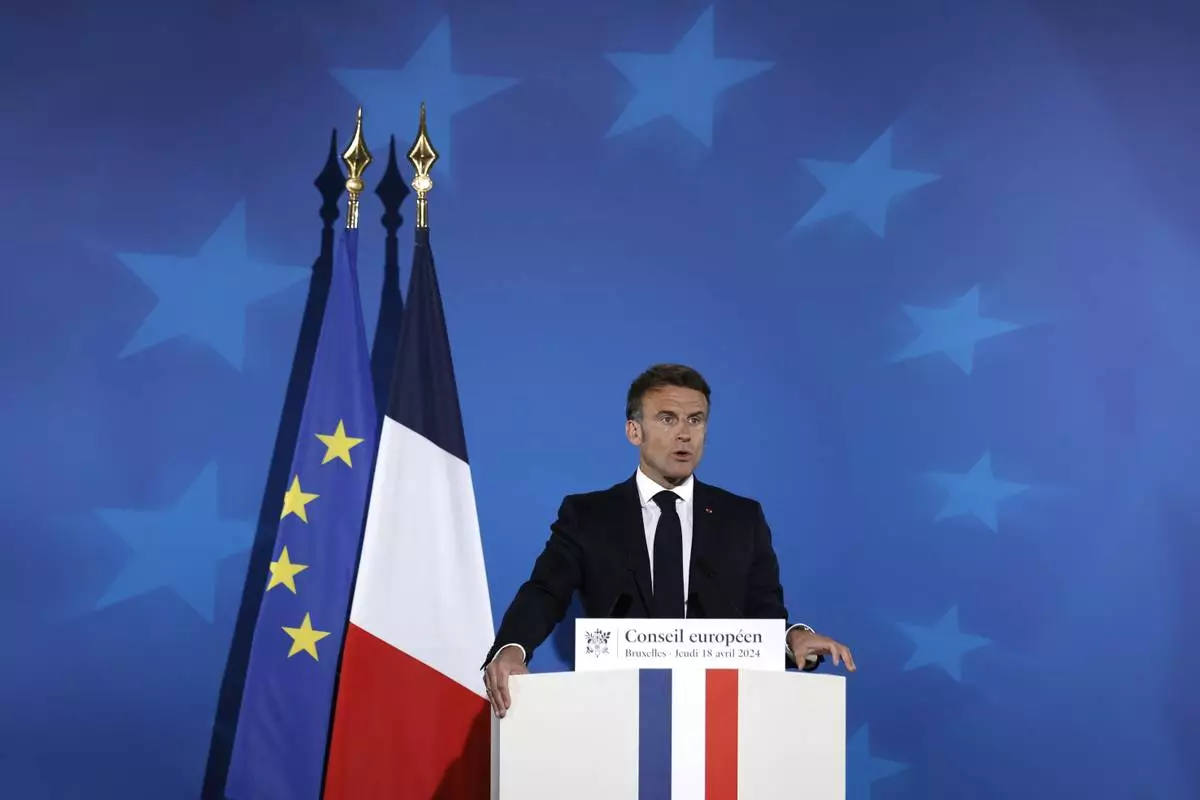
French President Emmanuel Macron speaks during a media conference at an EU summit in Brussels, Thursday, April 18, 2024. European Union leaders on Wednesday debated a new "European Competitiveness Deal" aimed at helping the 27-nation bloc close the gap with Chinese and American rivals amid fears the region's industries will otherwise be left behind for good. (AP Photo/Omar Havana)

































